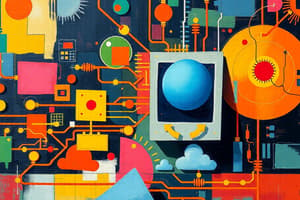Podcast
Questions and Answers
What is one of the concerns raised by the widespread use of digital technologies mentioned in the text?
What is one of the concerns raised by the widespread use of digital technologies mentioned in the text?
- Vulnerability to cyber attacks (correct)
- Standardization of ICT
- Spurring innovation
- Increased productivity
Which organization is described as a United Nations agency that coordinates global telecommunication networks and systems?
Which organization is described as a United Nations agency that coordinates global telecommunication networks and systems?
- European Telecommunications Standards Institute (ETSI)
- International Organization for Standardization (ISO)
- Institute of Electrical and Electronics Engineers (IEEE)
- International Telecommunication Union (ITU) (correct)
What do ICT standards help ensure across different systems and devices?
What do ICT standards help ensure across different systems and devices?
- Profit maximization
- Technological obsolescence
- Language diversity
- Interoperability, compatibility, and security (correct)
Which organization is a worldwide federation of national standards bodies that develops and publishes international standards?
Which organization is a worldwide federation of national standards bodies that develops and publishes international standards?
What is a key role of ICT standards mentioned in the text?
What is a key role of ICT standards mentioned in the text?
What does ICT stand for in the context of the text?
What does ICT stand for in the context of the text?
Which historical event laid the groundwork for the internet according to the text?
Which historical event laid the groundwork for the internet according to the text?
How has ICT influenced education according to the text?
How has ICT influenced education according to the text?
What technologies have opened up new frontiers in data analysis and automation according to the text?
What technologies have opened up new frontiers in data analysis and automation according to the text?
How has ICT impacted communication in society according to the text?
How has ICT impacted communication in society according to the text?
Flashcards are hidden until you start studying
Study Notes
ICT: A Dynamic Force Shaping Our World
Information and Communication Technology (ICT) is a broad term that encompasses the convergence of computing, telecommunications, and electronic devices. It's the engine driving innovation, connectivity, and communication on a global scale. Let's delve into the development, societal impact, and standards that define ICT today.
ICT Development
The journey of ICT is one of invention, innovation, and evolution. The first computer, ENIAC, was built in 1946, paving the way for more powerful machines and devices. In the 1960s, the first public packet-switched network, ARPANET, laid the groundwork for the internet. Since then, the rapid pace of development has led to the advent of mobile phones, laptops, tablets, and the internet of things (IoT).
ICT development has seen an exponential increase in speed, storage, and processing power. The advent of cloud computing, big data, and AI have opened up new frontiers in data analysis, automation, and prediction.
Role of ICT in Society
ICT has become a fundamental part of everyday life, shaping society in unprecedented ways. Communication has never been easier or more immediate. Social media, video calls, and messaging apps enable us to connect with people across the globe in real-time. ICT has also provided new opportunities for education, allowing students to access learning resources, collaborate with peers, and take online courses.
In the economic sphere, ICT has created new industries, increased productivity, and spurred innovation. Global trade, commerce, and finance have experienced an unprecedented boost due to the development of the internet and electronic payment systems.
ICT has also raised concerns over privacy, security, and the digital divide. The widespread use of digital technologies has made individuals and organizations more vulnerable to cyber attacks, misinformation, and other digital dangers. The digital divide, which refers to the imbalance of access to ICT resources, is a pressing issue that needs to be addressed.
ICT Standards
As ICT continues to evolve, there is a growing need for standardization. ICT standards are agreements that ensure interoperability, compatibility, and security across different systems and devices. They also help set benchmarks for quality, performance, and innovation.
Some of the key ICT standards bodies include:
- International Telecommunication Union (ITU): This is a United Nations agency that coordinates global telecommunication networks and systems.
- International Organization for Standardization (ISO): A worldwide federation of national standards bodies that develops and publishes international standards.
- Institute of Electrical and Electronics Engineers (IEEE): A professional association that sets standards for electrical, electronics, and computing technologies.
ICT standards help foster innovation, ensure compatibility, and promote interoperability. However, it's essential to acknowledge that standards are not set in stone. As technology advances, standards must evolve to keep up.
Conclusion
ICT has transformed our world, enabling us to connect, communicate, learn, and work in ways that were previously unimaginable. While the future of ICT is uncertain, one thing is clear: its impact will continue to shape our society for generations to come. As new technologies emerge, it's crucial that we approach them with an understanding of their capabilities, limitations, and potential applications. By doing so, we can ensure that ICT continues to serve as a catalyst for innovation, growth, and progress.
Studying That Suits You
Use AI to generate personalized quizzes and flashcards to suit your learning preferences.




